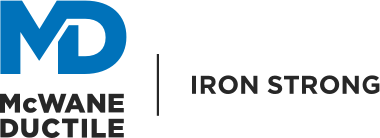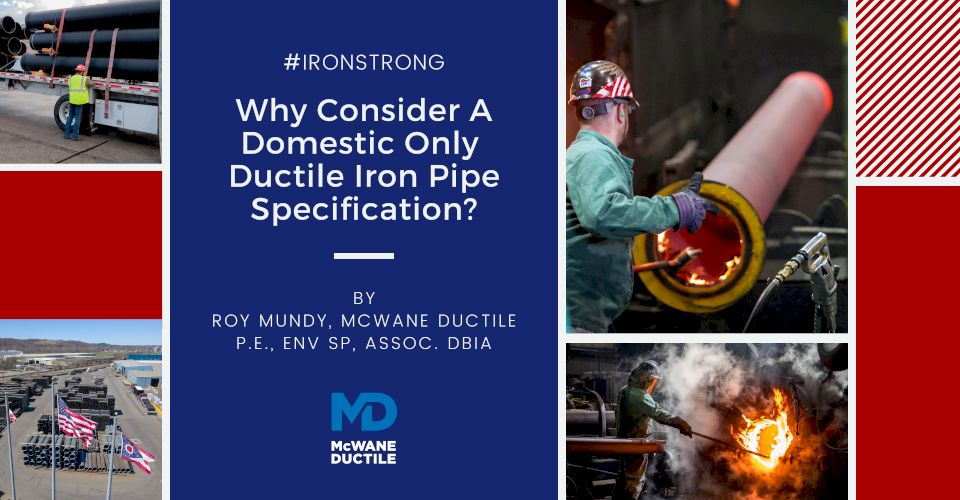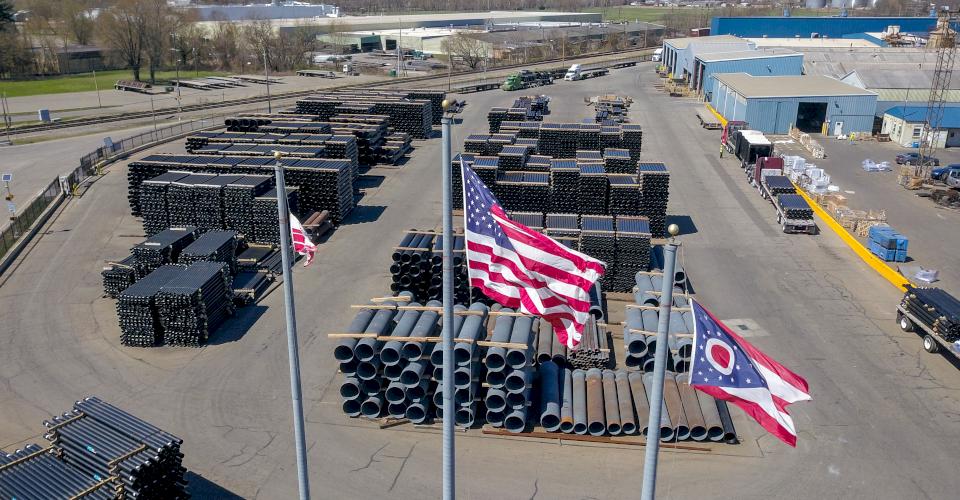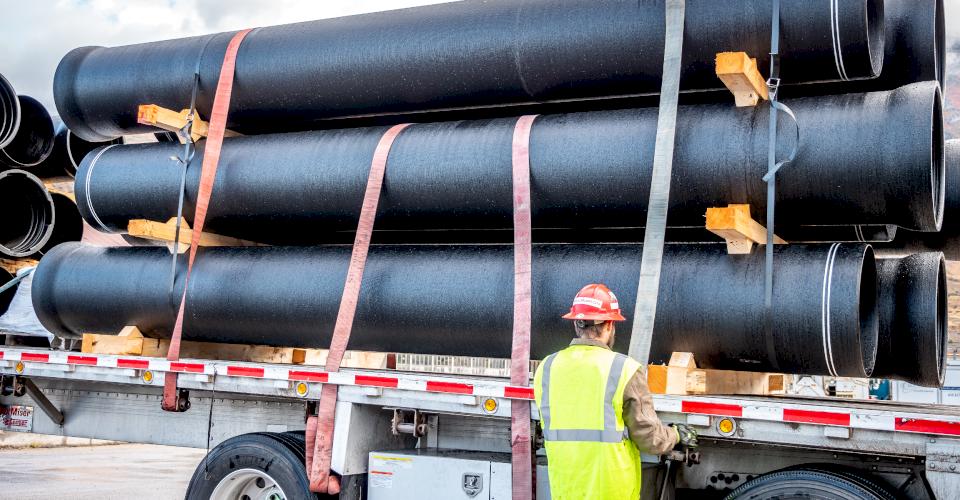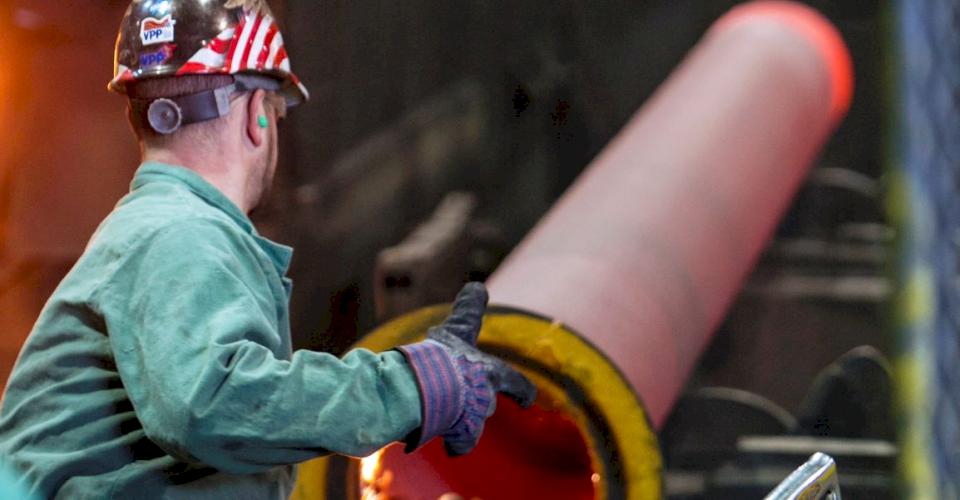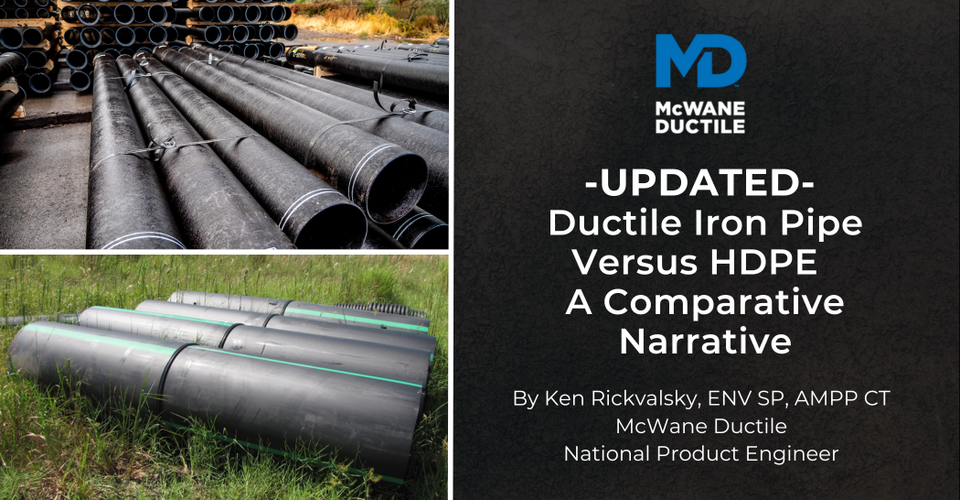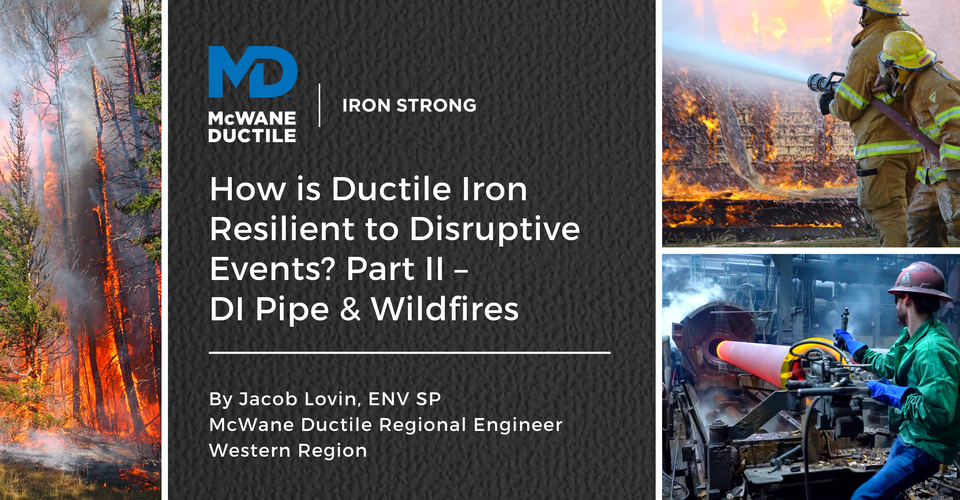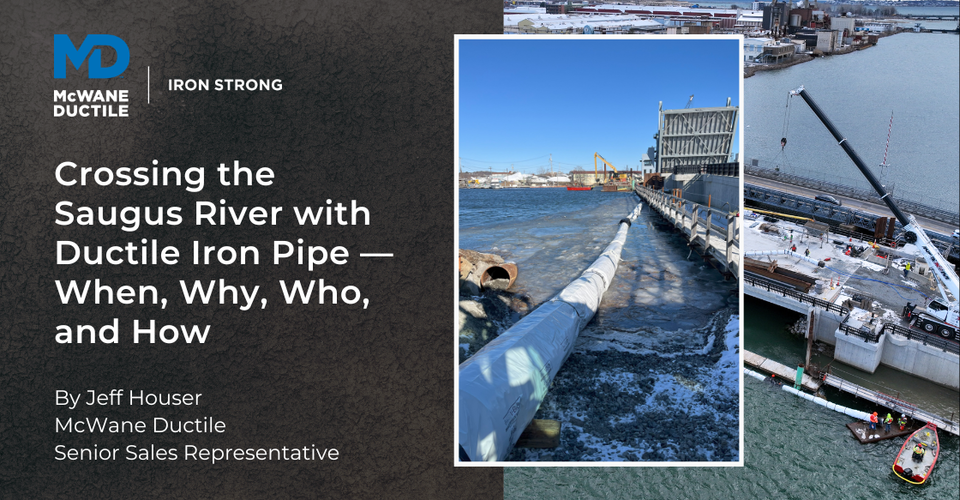Over the years, products manufactured in our country have continually provided us with resources to enhance our quality of life. One key component in this regard is the diligence we have seen from various entities to ensure products are manufactured properly, safely, and in a manner that protects the environment and sustains economic viability. In this Iron Strong Blog, initially published in January 2021 and now updated to reflect today's climate, we will discuss why to consider a domestic onlyDuctile iron pipe (DI pipe) specification.
Ductile iron pipe manufacturers in the United States follow stringent guidelines in the manufacture of their products. Methodologies and testing requirements developed by water and wastewater professionals are outlined in AWWA/ANSI standards for DI pipe regarding its manufacture, required capability, testing, design, and ultimate use.
Additionally, the facilities that produce DI pipe in the U.S. must comply with standards such as those provided by the Environmental Protection Agency (EPA), which protects the environment, and Occupational Safety and Health Association OSHA, which provides a safe workplace for employees. All these very important factors in total can only be found with domestically produced DI pipe. Today our blog will go further in detail, describing key attributes essential to the industry and our country’s economic health and national security that can only be obtained by domestically manufactured products in the United States.
How is Ductile Iron Pipe Quality Ensured?
Domestically produced Ductile iron pipe is manufactured in accordance with AWWA/ANSI C151 Standard. Additionally, agencies such as the National Sanitation Foundation (NSF) and Underwriters Laboratories (UL) provide third-party, independent testing to ensure the quality of the manufacturing process as well as the resultant product.
Some of the internal quality tests include:
- Base and Ductile chemistry,
- Charpy tests, which determine impact resistance
- Tensile tests confirming flexibility and strength
- Visual inspection from bell to spigot
- Gauged inspections confirming critical measurements
- Visual inspections and measures to ensure proper cement lining and paint quality
- All consummated by EACH joint of pipe being pressure tested at 500 psi before shipment to the customer.
Additionally, Mill Certs are utilized to track each pipe through the manufacturing process. These Mill Certs certify that all pipe shipped meet or exceed all required quality standards. This rigorous quality assurance is just one component that has allowed DI pipe to serve many communities across our country for decades. Learn more by watching the video below:
Conversely, Ductile iron pipe not manufactured domestically does not guarantee material quality with such measures just noted. Factories located thousands of miles away under government regulation are much different and many times laxer than that of the United States, leaving ambiguity instead of transparency regarding material quality. The DI pipe industry encourages clients to tour manufacturing facilities to see firsthand quality control and testing measures.
The transport of non-domestic Ductile iron pipe across thousands of miles, most probably in a saltwater environment, can be very detrimental to pipeline quality. In addition to corrosion, which can cause many application problems, high salt content in Portland cement with relatively hard water could cause degradation and failure of cement linings.
Who Are You Going to Call?
Having a readily available team of professionals to provide the customer with expertise during the design, construction, testing, and operation of a pipeline project is critical. An example of this professional resource provided specifically by McWane Ductile is:
- Registered Professional Engineers
- AMPP Certified Technicians
- ENVISION Sustainability Professionals
- Associate Design-Build Institute of America Professionals
All have varied and lengthy backgrounds in utility, consulting, plant, and field operations. This same personal and immediate service provided similarly by all domestic DI pipe manufacturers to customers is not in place nor readily available when dealing with entities thousands of miles away.
The location of the manufacturing process and support services within the U.S. where pipelines are installed is vital in delivering successful projects with quality pipeline materials. In addition to expert personnel, testing facilities of respective domestic DI pipe manufacturers are available to evaluate quality aspects of the manufactured product, frequently used to conduct forensic exams of material. Being located domestically provides an efficient and economical resource with a transparent operation, which is obviously not the case with facilities outside our country. To learn more about the research and testing performed on domestically manufactured DI pipe, see this informative Iron Strong vlog by my colleague, Jerry Regula.
What Are the Environmental Considerations of Domestic Pipe?
Ductile iron pipe is made of domestic steel scrap, preventing several thousand tons per week from being dumped in landfills and diverting one million tons of waste from landfills yearly. DI pipe not manufactured domestically is probably manufactured from pig iron, which is generally strip-mined. For more information on the recycled content of DI pipe, see this Iron Strong Blog by my colleague, Stuart Liddell.
Ductile Iron Pipe manufacturing facilities throughout the U.S. comply with EPA and OSHA Standards, which protect the environment and worker safety. Non-domestic DI pipe manufacturers do not live by these same standards, with the bar on both counts being much lower. From a carbon footprint aspect, fossil fuel utilization to transport heavy materials over thousands of miles vs. transport from domestically located facilities provides a more detrimental environmental impact when looking at non-domestic vs. domestically manufactured DI pipe.
What Are the Economic Impacts of Domestic Pipe?
The iron and steel industry are a dynamic part of the U.S. economy, generating more than $520 billion in total economic output and nearly two million American jobs in 2017. These jobs paid over $131 billion in wages and benefits. (1) Domestic Ductile iron pipe manufacturers provide thousands of these jobs in numerous communities throughout the United States and Canada. Employees are provided healthy, good quality employment with these wages benefiting respective economies both locally and nationwide.
According to the Economic Policy Institute, for every 100 iron and steel mill manufacturing jobs, there are 923.7 indirect jobs created. An example of this small business support is the scrap recycling business, where an average of 50 people are employed. This domestic DI pipe manufacturing component enhances the environment through recycled goods and improves our country's economic prosperity.
We are also seeing that leaders of our country, including the Executive Branch and Congress, in a bi-partisan fashion, have recognized the extreme importance of manufacturing products within the borders of our country, thus fostering job growth and economic development to the benefit of those living within the United States.
On November 15, 2021, President Biden signed the Infrastructure Investment and Jobs Act, including the Build America, Buy America Act (BABA). The Act strengthens Made in America Laws and will bolster America’s industrial base, protect national security, and support high-paying jobs. (2)
Additionally, the American Iron and Steel (AIS) Provision requires Clean Water State Revolving Fund (CWSRF) and Drinking Water State Revolving Fund (DWSRF) assistance recipients to use iron and steel products that are produced in the United States. The AIS provision is a permanent requirement for all CWSRF projects, with America’s Infrastructure Act of 2018 extending the AIS provision for DWSRF projects through Fiscal Year 2023. (3)
Who Offers Supply-Chain Security?
When constructing water and wastewater pipelines, TIME IS MONEY, as we all know. When a contractor must cease or slow work, added compensation for delay is usually in the conversation. Unknown conditions in the field often require adjustments that can only be made by the efficient supply of materials suited for that scenario.
Also, materials will, from time to time, have defects. When this occurs, an immediate forensic determination needs to occur, and the product replacement needs to be expeditious to get the contractor back to work. Trying to access replacement or specialty products from thousands of miles away can create inordinate delays and expenses.
What happens when a domestic Ductile iron pipe manufacturing plant ceases to produce pipe in natural disasters, work stoppage, or other factors that we currently contend with in today’s work environment? Logistics are in place to guarantee a seamless supply chain of domestically produced DI pipe.
In addition to the multiple manufacturing facilities of respective DI pipe suppliers, the industry has, on numerous occasions, provided resources collectively to guarantee the ample supply of Ductile Iron pipe in our country. This network of resources does not exist when looking at the use of non-domestic Ductile iron pipe.
Who Offers Total Project Solutions?
Domestically produced Ductile Iron pipe offers total pipeline solutions, including restrained joints, river crossing pipe, and applicable appurtenances. These offerings eliminate non-compatibility issues with manufacturing facilities and provide technical assistance close by to resolve field-related problems quickly without inordinate delays.
Why Domestic-Only Ductile Iron Pipe?
Leaders in our country have recognized the value and integrity of purchasing domestically made iron and steel, as demonstrated by the BABA Act and the American Iron and Steel Act. This recognition not only comes from the economic enhancement provided to our country but realizes the components of the material and environmental quality of American-made iron and steel products.
When pipeline specifications do not specifically spell out “Domestic Only Ductile Iron Pipe,” utilities may find themselves being required to accept material bids from non-domestic suppliers, not realizing or wanting to give up all the advantages realized by using domestically produced Ductile Iron pipe.
As we’ve discussed, there are compelling reasons to utilize American-made Ductile Iron Pipe. Contact your local McWane Ductile sales representative for more details about this topic. We have team members who have managed small and large water utility systems, served in engineering consulting firms, and bring decades of experience in solving field issues involving pipeline construction and operation. From design to submittal to installation, educate and assist water professionals throughout the water and wastewater industry.
As we've discussed, there are compelling reasons to utilize American-made Ductile iron pipe. I encourage you to check out our Iron Strong Insights Magazine's upcoming issues and our Iron Strong Blog as we will delve deeper into this topic over the next several months.
If you have any questions or need further assistance with anything DI pipe related, please contact your local McWane Ductile sales representative. We have team members who have managed small and large water utility systems, served in engineering consulting firms, and bring decades of experience in solving field issues involving pipeline construction and operation. From design to submittal to installation, we strive to provide education and assistance to water professionals throughout the water and wastewater industry.
Check Out All Our Digital Offerings
References
- American Iron and Steel Institute-Environmental Impact of American Iron and Steel Industry; John Dunham and Assoc., May 2018.
- Executive Office of the President, Office of Management and Budget; Memorandum for Heads of Executive Departments, Shalanda D Young, April 18, 2022.
- EPA Clean Water State Revolving Fund-American Iron and Steel (AIS) Requirement.
- American Iron and Steel Institute-Environmental Impact of American Iron and Steel Industry; John Dunham and Assoc., May 2018
